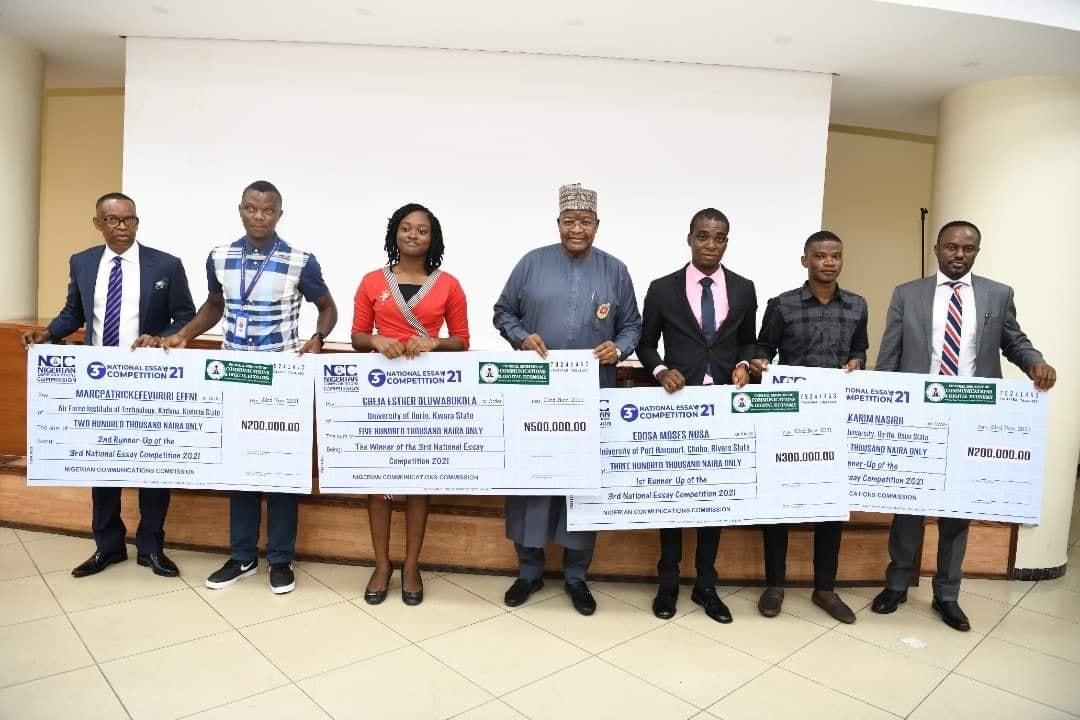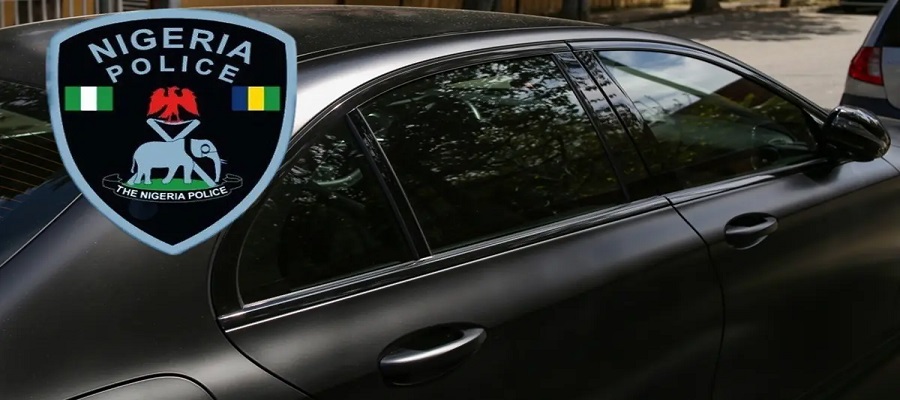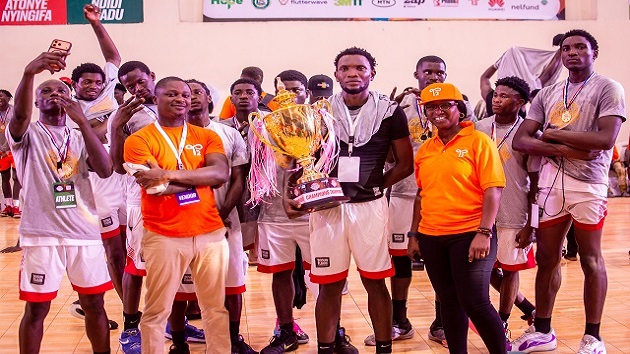General News
NCC Has Committed Over N200m to Research and Development, Says Danbatta

Prof. Umar Garba Danbatta, executive vice chairman and chief executive officer (EVC/CEO) of the Nigerian Communications Commission (NCC),has declared that the Commission had committed over N200 million into the promotion of research and development (R&D) in order to drive innovation in the country’s telecommunications sector.

L-R: Dr. Ikechukwu Adinde, Director Public Affairs, NCC; 3rd prize winner, MarcPatrick Efevuriri Efeni; 1st prize winner, Esther Gbeja; Professor Umar Garba Danbatta, Executive Vice Chairman, NCC; 2nd prize winner, Edosa Moses Mosa; 3rd prize winner, Nasiru Abdulkarim; and Edoyemi Ogoh, Deputy Director, Technical Standards and Network Integrity, NCC, at the event.
Danbatta stated this during the prize presentation ceremony of the 2021 NCC National Essay Competition held on Tuesday, November 23, 2021, at the Conference Room of the Commission’s Head Office in Abuja.
At the event which marked the 3rd edition of the annual competition organised by the Commission, the EVC said the Commission has invested modestly in research grants, instituted professorial chairs in universities across the country, supported tech startups, and sponsored national essay competitions and many more social investments in order to ensure synergy and linkages among industry, the academia and the youth.
Over 2,000 entries were received from 97 public and private tertiary institutions for the competition in which Esther Oluwabukola Gbeja, a 600-Level student of Veterinary Medicine at the University of Ilorin, was declared overall winner.
Gbeja received a cash prize of N500,000.00, a laptop, and a printer; while the first runner-up, Moses Nosa Edosa, a final year student of Accounting at the University of Port Harcourt, received a cash prize of N300,000.00 only.
Two second runners-up emerged from the competition to pick the third prize. MarcPatrick Efevuriri Efeni, a 200-Level student of Cybersecurity at the Airforce Institute of Technology, Kaduna; and Nasiru Abdul Karim, a 400-Level student of Computer Engineering at the Obafemi Awolowo University, Ile-Ife, both came third having scored same number of points. They both received cash prizes of N200,000 each.
The EVC said NCC gladly accommodated the additional prize due to the tie in the third place, as a mark of encouragement.
According to Danbatta, the topic for this year’s essay competition, “5G Technology: Opportunities & challenges”, was carefully chosen to ensure that the youths have a good understanding of the new technology.
He said Nigeria’s vibrant youth populace stands to benefit massively from the deployment of 5G technology, which the Commission is set to launch in 2022.
The NCC CEO said the Commission initiated and has maintained the annual essay competition to stimulate the interest of Nigerians especially the young people, to contribute to efforts in driving innovation in the technological ecosystem of Nigeria.
“It is on this premise that NCC took the step to encourage Nigerian students to remain pro-active and partake in the national competition that challenges students to be competitive and engage their best efforts,” he said.
While emphasizing the critical importance of communications as the foundation for the technological development of society and its role in the provision of vital infrastructure for national security, the EVC highlighted the need to invest in research programmes as observed in advanced nations, where a lot of resources are channeled into R&D.
Prof. Danbatta seized the opportunity provided by the event to reiterate the assurances of the Commission to Nigerians that 5G technology will expand the mobile ecosystem into a new realm and the impact will be felt in various sectors of the economy.
The Chairman of the 3rd NCC National Essay Competition Committee, Edoyemi Ogoh, who is also a Deputy Director in the Commission’s Technical Standards and Network Integrity Department, commended the EVC’s effort in recognising the academia as a key stakeholder in the development of the communications sector, and in encouraging that critical sector to have a natural connection with the industry.
Ogoh further said that the Commission “knows the importance of innovative thinking in the growing ICT industry in Nigeria and as such, this has made the Commission to engage youths in various tertiary institutions across the nation to compete in essay writing on 5G technology.”
Also speaking at the event, Dr. Ikechukwu Adinde, Director, Public Affairs at the NCC, said the essay competition is one of the most important initiatives the Commission, and expressed his delight at the ability of the winners who have demonstrated vast knowledge on the subject matter during their presentation.
Adinde also emphasised the influence of the competition in the stimulation of the minds of the target audience and the creation of positive awareness to debunk misconceptions about the 5G technologies.
The Director Public Affairs said, the outcome of the competition is an encouragement to the NCC Management to continue to support the national essay competition while ensuring that the Commission sustains such programme.
He said the results are evident today as the NCC has, through the essay contest, produced four ambassadors of 5G.
“These youths can go out and engage their peers about 5G, its benefits, opportunities and address the negative preconceptions about the 5G network,” Adinde said.
The essay competition was initiated by the NCC to deepen awareness and knowledge of telecommunications stakeholders in the country, especially the young people.
Interestingly, every successive year, the competition is marked by massive responses in the number of essays submitted by students.
Though the Commission has been able to organise three of such national essay competitions, the resultant social and emotional equity has had impressive and quantifiable values on the Commission as a leading Nigerian public sector brand.
General News
Nigeria Police suspends tinted glass permit enforcement over court injunction

Nigeria Police Force has suspended nationwide enforcement of its tinted glass permit policy, hours before its scheduled rollout, in compliance with a Delta State High Court order.

Tinted glass permit
The policy, set for January 2, 2026, aimed to curb vehicle-related crimes but faced legal challenge from a private citizen against the Inspector-General of Police, the force, and Delta Police Commissioner.
An ex parte injunction issued in December 2025 restrained enforcement pending suit determination, prompting the hold announced by spokesperson Benjamin Hundeyin on January 1.
Police entered appearance, filed preliminary objections, and sought injunction vacation; hearing adjourned to January 20, 2026.
The Nigerian Bar Association condemned initial police plans as “executive recklessness,” accusing disregard for rule of law, while police insisted no permanent bar existed on statutory duties.
IGP Kayode Egbetokun reiterated adherence to law while prioritising public safety via intelligence-led strategies during proceedings.
General News
NDIC Reinforces Full Oversight Compliance to Safeguard Depositors

Mr. Thompson Sunday, the Managing Director/Chief Executive of the Nigeria Deposit Insurance Corporation (NDIC), has reaffirmed the Corporation’s strict compliance with fiscal and financial regulations, including the provisions of the Fiscal Responsibility Act (FRA) 2007, noting that the NDIC has consistently remitted the required percentage of its earnings to the Federal Government.

Mr. Sunday made this known during a courtesy visit to the Managing Director/Chief Executive of the Ministry of Finance Incorporated (MOFI), Dr. Armstrong Takang, as part of NDIC’s ongoing engagement with key stakeholders following his formal assumption of office in July 2025.
According to him, NDIC takes financial accountability and transparency seriously, stressing that the Corporation complies fully with statutory remittance obligations, including the payment of 20 per cent of gross earnings or 80 per cent of net surplus to the Federal Government, as applicable. He added that NDIC also submits its financial statements ahead of statutory deadlines.
The NDIC MD/CE explained that this culture of compliance aligns with the Corporation’s role as a key institution within Nigeria’s financial safety-net, charged with protecting depositors and promoting confidence in the banking system. He emphasized that adherence to fiscal discipline remains central to NDIC’s credibility and effectiveness.
Mr. Sunday further disclosed that NDIC also complies with the Federal Government’s 50 per cent cost-to-income ratio policy, although he noted that the policy poses operational constraints. He explained that the deductions affect NDIC’s ability to build a strong Deposit Insurance Fund, which is needed to respond effectively to bank failures.
He stressed that international best practices under the Core Principles for Effective Deposit Insurance issued by the International Association of Deposit Insurers (IADI) require deposit insurers to maintain adequate funds to reimburse depositors when banks fail without recourse to government, adding that the NDIC is seeking an exemption to strengthen its capacity in this regard.
Mr. Sunday described MOFI as a critical stakeholder, noting that the Federal Government, through MOFI, holds a 40 per cent equity stake in NDIC. He said sustained collaboration with MOFI is essential to ensuring that NDIC continues to meet its obligations to government while effectively safeguarding depositors’ funds.
In his remarks, Dr. Takang commended the NDIC for its exemplary collaborative spirit and acknowledged the Corporation’s compliance with fiscal regulations. He assured that MOFI would continue to engage the Federal Ministry of Finance on NDIC’s behalf, noting that a strong NDIC is vital to sustaining confidence in Nigeria’s financial system.
Both institutions reaffirmed their commitment to continued cooperation, transparency and accountability, with Mr. Sunday reiterating that NDIC remains focused on balancing regulatory compliance with its overriding mandate of depositor protection and financial system stability.
General News
T2 Backs Youth Excellence as NCBC Wins Bosun Tijani Foundation Basketball Tournament

T2 has reaffirmed its commitment to youth development and excellence through sport as the NCBC basketball team, adopted by the brand, emerged champions of the Bosun Tijani Foundation Youth Basketball Tournament held at the Alake Sports Complex, Ijeja, Abeokuta.

The tournament, organised by the Bosun Tijani Foundation in collaboration with the Ogun State Government and supported by several partners including T2, brought together 12 competitive teams from across Nigeria, positioning basketball as a powerful platform for youth engagement, discipline, and opportunity.
NCBC’s championship run reflected the values T2 seeks to champion, work ethic, intelligence, teamwork, and resilience. The team recorded commanding victories over Team Vision, Warlords, and Elevate before defeating the Ilupjeu Raiders 66–52 in a gripping final.
Commenting on the adoption of the team, Seni Ogunkola, Vice President, Brands and Communication, T2 stated “NCBC embodies the qualities we believe in, exceptional work rate, intelligence on the ball, discipline, and a hunger to excel. By supporting them, T2 is investing in potential, purpose, and the next generation of leaders on and off the court.”
The climax of the event saw His Royal Highness, Oba Adedotun Gbadebo, the Alake of Egbaland, alongside Nigeria’s Minister of Communications and Digital Economy, Bosun Tijani, present the trophy to the victorious team, drawing rapturous applause from spectators. The event was also attended by the Chief of Staff to Ogun State Governor Dapo Abiodun, Mr. Lere Olayinka, and the Ogun State Commissioner for Sports, Honourable Wasiu Isiaka, underscoring strong institutional support for youth-focused initiatives.
Through its participation in the tournament, T2 continues to position itself as a brand that goes beyond sponsorship, championing platforms that unlock talent, inspire ambition, and create lasting social impact for Nigerian youth.

 Telecom2 days ago
Telecom2 days agoT2 Faces NCC Probe in Benue Over Major Service Outage in 9 LGAs

 Telecom2 days ago
Telecom2 days agoMTN Nigeria Crowns Ayo Benzi Winner of Next Afrobeats Star

 E-Business2 days ago
E-Business2 days agoJumia CEO says Black Friday Signals Nigeria’s E-Commerce Maturity

 E-Financial2 days ago
E-Financial2 days agoGTCO Secures Regulatory Approvals to Raise N10bn in Private Placement

 General News2 days ago
General News2 days agoNDIC Reinforces Full Oversight Compliance to Safeguard Depositors

 Telecom2 days ago
Telecom2 days agoNCC Unveils Draft 5-Year Spectrum Roadmap, 60 GHz License-Exempt Guidelines to Boost Broadband, Innovation

 Telecom2 days ago
Telecom2 days agoNCC Grants 45 Days for Telecoms Firms to Fix Unapproved Shareholding Changes

 E-Financial1 day ago
E-Financial1 day agoBanks to Impose N50 Stamp Duty on Transfers of N10,000 and Above from January 1

















